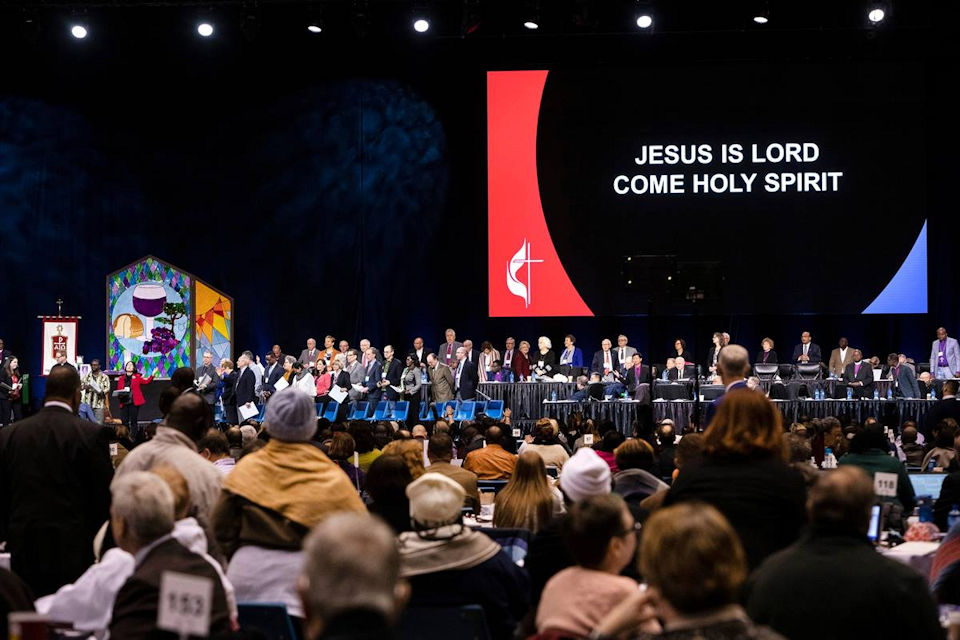General Conference is now eight months ahead. The deadline for legislation is past and petitions are being translated and prepared for action in May of 2020.
HEATHER HAHN
UM News
The deadline to submit legislation to the 2020 General Conference is now in the rearview mirror. So what is ahead?
The coming months will provide a fuller picture of what options will be before delegates when The United Methodist Church’s top lawmaking assembly meets May 5-15 at the Minneapolis Convention Center.
A big focus of the coming assembly will be dealing with the fallout of this year’s special General Conference. The contentious gathering has led to varied proposals for the denomination’s future in light of its still-unresolved debate over homosexuality.
But getting legislation into a format that is readily accessible for a multinational and multilingual denomination takes time.
By denominational rules, the Advance Daily Christian Advocate — which contains the petitions and reports requiring General Conference action — must be distributed to delegates at least 90 days before the assembly begins. That date is Feb. 5 for the 2020 gathering.
“It’s a pretty safe bet that we can have it ready in advance of that 90-day publication date,” Brian Sigmon, the editor of the Daily Christian Advocate and its advance edition, told the Commission on General Conference at the group’s August meeting.
He and other General Conference organizers hope to have the Advance Daily Christian Advocate available online for download as soon as the materials are finalized.
As of Sept. 19, General Conference staff said it was still too soon to know an exact date.
The entire Advance Daily Christian Advocate must be available in the four official General Conference languages — English, French, Portuguese and Kiswahili. Typically, about 1,000 petitions are submitted for consideration at a regularly scheduled General Conference.
Proposals coming to GC2020 include legislation to add five more bishops to Africa, to revise the Social Principles, to create a new structure for U.S. decision-making and to establish the 2021-24 general church budget. All four of these proposals were drafted by international church bodies.
United Methodist News also confirmed that petitions have been submitted for at least three plans for the denomination’s future.
In alphabetical order, these include:
- The Indianapolis Plan, submitted by the Rev. Kent Millard and assembled by a group of centrists, traditionalists, and progressives. This plan includes provisions for separating into different denominations depending on views around homosexuality.
- New Forms of Unity, submitted by the Texas Conference’s Bishop Scott Jones. Under this plan, an annual conference could become a self-governing church or join an existing one. Jones first began working on the plan with the Michigan Conference’s Bishop David Bard. Bishops do not have a vote at General Conference.
- The UMCNext Proposal, assembled by a group of centrists and progressives. This proposal lifts restrictions related to gay ordination and same-sex weddings while allowing local churches that disagree to depart and organize into new forms of Methodism.
These three plans were all drafted in the United States.
However, this is not a comprehensive list of the options that will be before the delegates to reorganize or divide the denomination and its assets. Individual United Methodists also can submit legislation, and some already announced plans to do so ahead of the deadline.
During the shortened special General Conference, delegates considered plans that contained multiple petitions as a package. But General Conference organizers have decided that won’t be the case at GC2020, at least not initially.
The Rev. Abby Parker Herrera — General Conference petitions secretary — has the task of giving numbers to each properly submitted petition and assigning it to one of 14 legislative committees or the Standing Committee on Central Conference Matters.
The legislative committees deal with different subject matters and related sections in the Book of Discipline, the denomination’s policy book. The standing committee deals with proposals that affect United Methodist regions in Africa, Europe, and the Philippines.
These committees are the first stop where legislation is debated, refined and possibly approved to go to the full General Conference plenary for a vote.
So if a plan has multiple petitions that deal with different sections of the Discipline, those petitions will first head to the committees that handle those sections.
If petitions coming from multiple committees need to be considered together, the Committee on Agenda and Calendar can schedule that, said the Rev. Gary Graves, General Conference secretary.
There is also a Committee on Reference, which meets at the start of General Conference and considers requests to reassign petitions to different legislative committees.
The Book of Discipline requires all valid petitions to receive a vote in legislative committee, and all petitions approved by a legislative committee to receive a vote in plenary.
The 2020 General Conference will have 862 delegates overall, equally split between clergy and laity. (The Michigan Conference seats eight delegates.) Of the 2020 delegates, 55.9% will be from the U.S., 32% from Africa, 6% from the Philippines, 4.6% from Europe and the remainder from concordat churches that have close ties to The United Methodist Church.
As the big meeting approaches, Graves and other General Conference organizers urge continued prayers for all staff and volunteers working diligently to prepare.
Last Updated on October 31, 2023

